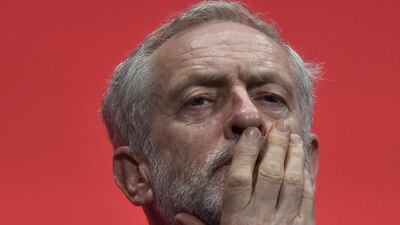Westminster’s hardiest truism is that Conservative governments are brought down by sex scandals and Labour administrations by money.
Controversy surrounding leading ministers last week opened up a circular firing squad around Theresa May, a hapless figure marooned in Downing Street.
Many prime ministers have clung to power when the last vestiges of real authority has gone. Yet Mrs May resembles the falling body breaking through multiple trap doors.
In treacherous times, every slip has consequences. With a proto-Communist opposition lurking in the wings, Britain is at its most dangerous juncture since the 1970s.
It is tempting to think the latest scandal is the high point of the cycle of scandal. Power provides a veil for those at the pinnacle and that makes it hard to gauge the acute danger of the moment.
Gordon Brown, Mrs May's predecessor but one, reveals in his new memoir My Life, Our Time, that he was almost physically blind when the similarly toxic expenses scandal blew up in 2009.
The dark and complex Mr Brown was often said to have been haunted by the loss of an eye as a young rugby-playing man. However, in his own book he reveals that in September 2009 he could “see very little” as the other eye faltered. At one point Mr Brown had to pretend he was reading a speech as he recited from memory.
_____________________
Read more from Opinion
Virginia election a bellwether for the new Republican model
Defeat tyranny by offering a better alternative
Trump in the White House: a year in the life of a third-party president
_____________________
A gaffe caused by vision problems would have finished him off. The expenses scandal exposed a government incapable of basic leadership. The public perception was that his administration was interested in its own survival and little else.
Incumbents can weather almost any immediate crisis and survive. Yet with Mrs May there is particular cause to fear that her demise could come more suddenly than even that of Mr Brown.
A forced resignation of Michael Fallon, her defence minister, knocked away a pillar of stability in the cabinet. Ministers are openly trading bitter accusations of treachery. By promoting her own favourite, Gavin Williamson, as the new defence chief, Mrs May has invited scheming colleagues to seek a moment of revenge.
Look beyond the personnel involved and the overall circumstances she faces are dire.
As investigations were launched last week into funding of the 2016 Brexit referendum, it is now becoming clearer that Russian interference on the right of British politics parallels the destabilisation exercise in the United States.
Should the government fall, the Conservative Party can no longer be seen as an automatic bulwark of power, dominant from the right to the centre.
On the left, Mrs May faces a Labour Party cunningly led by organisers and campaigners. Veterans of the politics of mobilising for a cause surround Jeremy Corbyn. These revolutionaries are attuned to the times.
Conservative weakness and the flux of events is their golden opportunity. A generational divide is the new rift around which politics is reforming. The narrative of establishment decay and leadership chaos is tailor-made for mobilising voters around a new direction for Britain.
The inexorable pressures of negotiating Brexit intensifies these trends. It constrains the Conservatives from offering anything other than managerial truisms that cannot satisfy the radical mood.
_____________________
Read more from Damien McElroy
In Europe, economic growth obscures what is at best a fragile revival
Libya must learn from Somalia to progress
Fighting fake news cannot be trivialised. It is the scourge of our times
_____________________
Once in power Mr Corbyn has a platform to take Britain down the path taken by Venezuela and other failed leftist economies.
The phrase it couldn’t happen here no longer applies to our times. As such the question of Conservative collapse reverberates beyond the national borders.
The shift would be both swift and decisive.
The Labour budget programme is already well known. John McDonnell, the ideologue in charge of Labour policy, has been working on his plans for decades.
His blueprints involve a massive debt-based investment spree piled on top of heavy government expenditure on welfare.
As the economy is only just moving off ultra-low interest rates and massive asset price inflation, Mr McDonnell's home-cooked recipes would be the equivalent of a fuel-air mixed economic explosion.
The collapse of public faith in globalisation, international trade, private investment and free markets compounds the vulnerability to Mr Corbyn’s experiments. A disorderly withdrawal from Europe in these circumstances would rank merely as a contributor to British collapse, not the primary cause.
On the top deck of a London bus this week, a Ukrainian MP and Pakistani MP discussed the resignation of London’s defence minister in bemusement. “In my country the defence minister would stay in his job and say he would wait for the court to decide,” said the Ukrainian. The Pakistan delegate was a little more blunt. “In my country this wouldn’t happen,” he replied.
Compared to the rest of their conversation about nuclear non-proliferation, the exchange seemed trivial.
One the great features of Britain's resilient democracy is that the rotten are cleared out when their faults are exposed. The stakes in the current crisis could not be greater.

